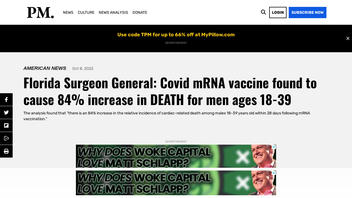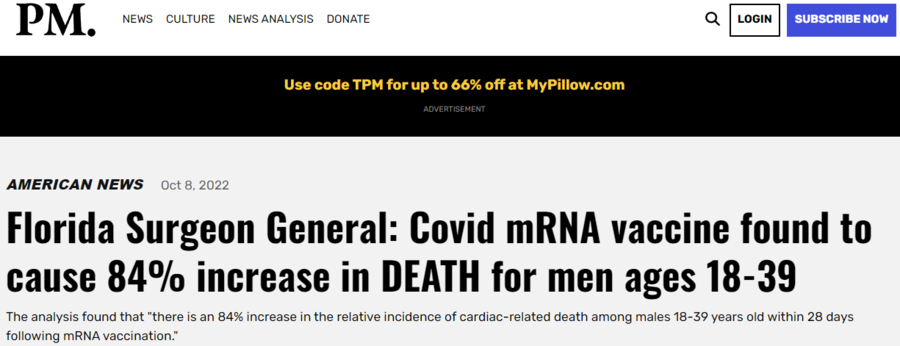
Have COVID mRNA vaccines been found to cause an 84 percent increase in death for men ages 18-39? No, that's not true: Lead Stories asked medical experts about the claim and they said it is misleading and can be misinterpreted to imply that a large percentage of the people who get the vaccine may die. Instead, the vaccines increase the risk of heart damage or heart-related death "from a very low baseline to still a very low number," according to Dr. Luis Ostrosky, chief of infectious diseases with UTHealth Houston and Memorial Hermann Health System.
The claim appeared in an article (archived here) published by The Post Millennial on October 8, 2022 and entitled "Florida Surgeon General: Covid mRNA vaccine found to cause 84% increase in DEATH for men ages 18-39." The article opened:
The analysis found that "there is an 84% increase in the relative incidence of cardiac-related death among males 18-39 years old within 28 days following mRNA vaccination."
This is what the article looked like at the time of writing:
(Source: The Post Millennial screenshot taken on Tues Oct 11 15:08:03 2022 UTC)
Misleading headline
The headline for The Post Millennial (PM) article shorthands an analysis (archived here) released by Florida Surgeon General Dr. Joseph A. Ladapo on October 7, 2022. The title suggests that COVID mRNA vaccines have been found to cause an 84 percent increase in death for men ages 18-39.
Instead, the controversial COVID vaccine guidance from Ladapo said that "there is an 84% increase in the relative incidence of cardiac-related death among males 18-39 years old within 28 days following mRNA vaccination." The study cited by the Florida surgeon general does not name its authors and has not been peer-reviewed.
In an October 11, 2022, phone interview with Lead Stories, Ostrosky said the PM article is troubling from the start:
That headline is greatly misleading. Because it can be misinterpreted ... to imply that 85% [sic] of people that get the vaccine may have heart damage or heart-related death.
According to Ostrosky, the key words are "relative incidence":
It really talks about the relative risk for infection or mortality threat. So, let's just start by the fact that the incidence of cardiac-related deaths and mortality, that ... is very low. And that [COVID mRNA vaccination] does maybe increase it slightly, but from a very low baseline to still a very low number. ... it's entirely misleading.
Still, Ladapo used the study to make the following recommendation:
As such, the State Surgeon General recommends against males aged 18 to 39 from receiving mRNA COVID-19 vaccines. Those with preexisting cardiac conditions, such as myocarditis and pericarditis, should take particular caution when making this decision.
Vaccine v. COVID-19
In April 2021, the Centers for Disease Control and Prevention (CDC) documented a slightly higher risk of myocarditis, or inflammation of the heart muscle, with the use of mRNA vaccines than exists among the unvaccinated. This was particularly the case for "adolescent and young adult males, ages 16 years and older ..." the CDC wrote.
Dr. Dean Winslow, a professor of medicine at Stanford University, told Lead Stories in an October 12, 2022, email that vaccination is still the safer route, even for men aged 18-39:
The mRNA vaccines were statistically associated with myocarditis in young males, but that myocarditis was almost always mild and resolved. The rate of myocarditis in this group and in all age/gender groups, however, is significantly greater with natural infection with SARS-CoV-2 than it is with vaccination. So, the risk/benefit clearly favors all age groups be vaccinated.
Ostrosky agrees. He said getting the vaccine is safer than getting the disease:
The CDC and FDA [Food and Drug Administration] have done very detailed analysis showing that the incidence of those heart events in the vaccine is lower than the incidence of those same heart events in people that get COVID-19, i.e., your likelihood of dying from a heart issue related to COVID is much higher than the likelihood of dying from a heart issue related to the vaccine.
Therefore, the risk-benefit analysis has always favored the utilization of the vaccine in every age group. So, I feel that coming up with a recommendation of avoiding vaccination in 18- to 39-year-old males is not following the science or the full picture.
CDC recommendations
The CDC says COVID-19 vaccines are safe and effective. It recommends them for everyone 6 months and older and boosters for everyone 5 years and older, if eligible.
Other Lead Stories fact checks about COVID vaccines can be found here.

















